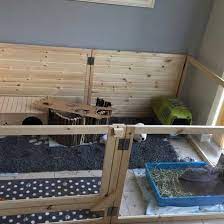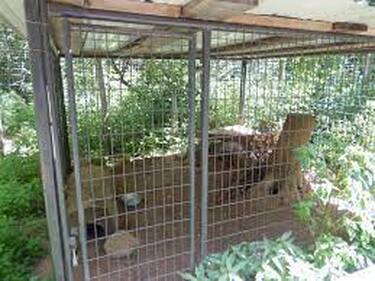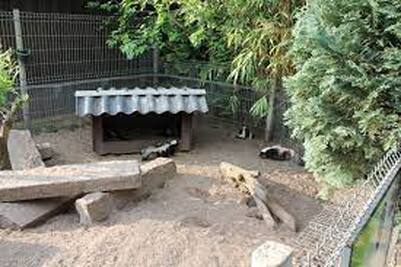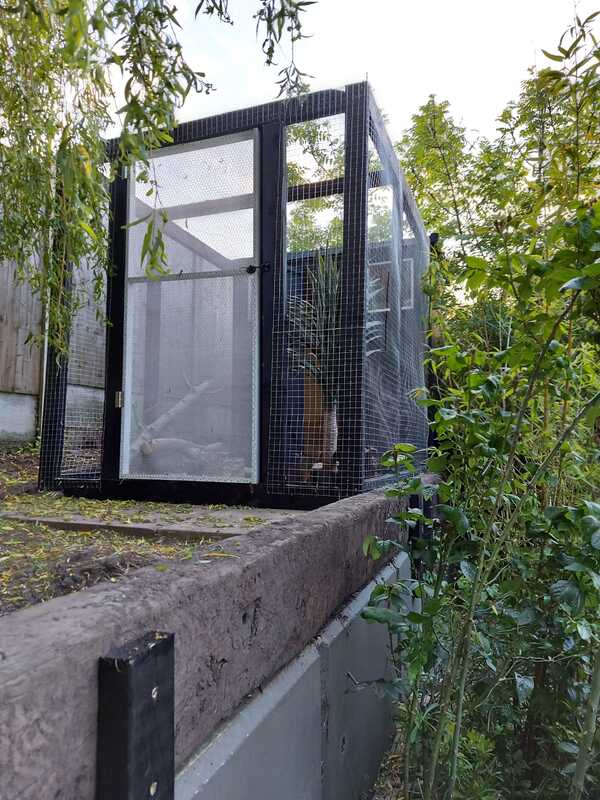General Information:
Skunks are not common pets, so they're considered exotic mammals. You must do your research before deciding if you want a skunk as a pet. They all have incredibly different personalities and, if unsocialised, they can be quite aggressive.
They belong to the family Mephitidae, which translates to stink. Skunks can be comparable to animals such as polecats and badgers. The domesticated skunk is Mephitis mephitis (which loosely translates to 'bad odour'), commonly known as the striped skunk.
They're crepuscular or nocturnal animals and are usually solitary, but do naturally have overlapping home territories.
Fun Fact:
In the UK, it is illegal to remove a skunk's anal scent glands. Skunks are probably most known for their anal scent gland which can produce a foul odorous spray when feeling threatened. They can spray that scent as far as 3 metres!
They can live for around 6-10 years.
Keeping striped skunks in captivity is a challenging fact and whilst owners seem to gain from their unusual companions, ultimately the skunk is at a disadvantage by being kept in captivity. For that reason, keeping them in captivity should be discouraged.
Care:
Housing/Enrichment:
Skunks can be housed both indoors and outdoors.
Indoors:
Skunks are wild animals that are destructive and intelligent animals, it's really important that wherever you're housing your skunk or allowing them to roam, you must ensure it's safe for them and that they can't hurt themselves.
Most people will build their skunks an enclosure, We'd ideally give your skunk a secure area that is a minimum of 10ft in length by 3-6ft in width with additional room to exercise. Be mindful that skunks are incredible escape artists, very mischevious, and aren't afraid to throw tantrums here and there.
Skunks can be litter trained, but not always. We'd recommend that you buy a large litter tray and place it in the corner of a room as skunks will usually go to the toilet within a corner. Some skunks may hide their faeces.
Spot-clean daily to ensure their environment is kept as clean as possible. Skunks may wipe their bum on their floor, this is less of an issue on easily cleaned surfaces such as tiles.
Skunks love to dig, so if you can provide them with areas of a deep substrate or digging boxes to allow them to carry out their natural behaviours.
Skunks also love areas to rest in beds or housing, they also enjoy a variety of safe pet toys.
Useful Links:
Skunks are not common pets, so they're considered exotic mammals. You must do your research before deciding if you want a skunk as a pet. They all have incredibly different personalities and, if unsocialised, they can be quite aggressive.
They belong to the family Mephitidae, which translates to stink. Skunks can be comparable to animals such as polecats and badgers. The domesticated skunk is Mephitis mephitis (which loosely translates to 'bad odour'), commonly known as the striped skunk.
They're crepuscular or nocturnal animals and are usually solitary, but do naturally have overlapping home territories.
Fun Fact:
In the UK, it is illegal to remove a skunk's anal scent glands. Skunks are probably most known for their anal scent gland which can produce a foul odorous spray when feeling threatened. They can spray that scent as far as 3 metres!
They can live for around 6-10 years.
Keeping striped skunks in captivity is a challenging fact and whilst owners seem to gain from their unusual companions, ultimately the skunk is at a disadvantage by being kept in captivity. For that reason, keeping them in captivity should be discouraged.
Care:
Housing/Enrichment:
Skunks can be housed both indoors and outdoors.
Indoors:
Skunks are wild animals that are destructive and intelligent animals, it's really important that wherever you're housing your skunk or allowing them to roam, you must ensure it's safe for them and that they can't hurt themselves.
Most people will build their skunks an enclosure, We'd ideally give your skunk a secure area that is a minimum of 10ft in length by 3-6ft in width with additional room to exercise. Be mindful that skunks are incredible escape artists, very mischevious, and aren't afraid to throw tantrums here and there.
Skunks can be litter trained, but not always. We'd recommend that you buy a large litter tray and place it in the corner of a room as skunks will usually go to the toilet within a corner. Some skunks may hide their faeces.
Spot-clean daily to ensure their environment is kept as clean as possible. Skunks may wipe their bum on their floor, this is less of an issue on easily cleaned surfaces such as tiles.
Skunks love to dig, so if you can provide them with areas of a deep substrate or digging boxes to allow them to carry out their natural behaviours.
Skunks also love areas to rest in beds or housing, they also enjoy a variety of safe pet toys.
Useful Links:
Outdoors:
When keeping an outdoor skunk, remember that they're brilliant diggers and escape artists. It's wise to have some underfloor protection for your skunk. They need a secure and sizable enclosure; 10ft in length and 3-6ft wide as a minumum. They must be safe from extreme weather conditions and predators.
As with indoor accomodation, most people have their enclosure custom-built.
Your skunk should not be enclosed into their cage all day as it isn't good for their physical and mental well-being.
As with indoor accommodation, it is important their environment is enriched so they can exhibit their natural behaviours,
When keeping an outdoor skunk, remember that they're brilliant diggers and escape artists. It's wise to have some underfloor protection for your skunk. They need a secure and sizable enclosure; 10ft in length and 3-6ft wide as a minumum. They must be safe from extreme weather conditions and predators.
As with indoor accomodation, most people have their enclosure custom-built.
Your skunk should not be enclosed into their cage all day as it isn't good for their physical and mental well-being.
As with indoor accommodation, it is important their environment is enriched so they can exhibit their natural behaviours,
Socialising:
Striped skunks are solitary, apart from during their mating season. You may notice that your skunk has a stronger odour during the breeding season too - this is very normal.
Skunks are often more friendly when young and become more aggressive when older - it is advised you neuter your skunk. When socialising with your pet skunk, you must know their body language. We've already highlighted that skunks may spray when threatened, but their behaviour is more complex than you may have anticipated. They can form strong bonds with their owners, but this bond isn't given to just anyone - they only bond to those who've earned it.
Positive traits may include:
Negative traits may include:
Aggressive behaviours include:
Diet:
Skunks are omnivorous and can be both picky and messy eaters. Despite being picky eaters, they are bingers on food that they like and are prone to obesity. They also enjoy foraging for their food and this can be used as a great activity for mental stimulation.
Sadly, as uncommon exotic pets, there is little research into recreating a skunks diet in captivity. Research suggests approximately 70-90% of a wild skunks diet is animal material and 30-10% plant material. They naturally feast on large amounts of insects, small mammals, fish, carrion, leaves, grasses, and similar items.
BSAVA veterinary manual suggests:
It is recommended by breeders to follow the following dietary proportions:
Supplements:
There is controversy surrounding using supplements with skunks. We personally use supplements in our skunk's diets, but try and promote providing everything your skunk needs through their diet, rather than relying on supplements.
If you're unsure, please consult your exotic veterinarian.
You can use supplements suitable for humans or dogs, ideally use pharmaceutical grade supplements.
Remember, your skunk's eating habits and body weight will often change during the hibernation period.
Health:
IT IS ILLEGAL TO DESCENT YOUR SKUNK IN THE UK.
Neutering:
In our opinion, you must spay your female or castrate your male skunk when they're of an appropriate age.
Intact skunks can present with more behavioural issues and will often be far more aggressive towards you. Your skunks are also prone to more health issues if they remain intact.
If performed by a veterinarian experienced with exotics/skunks, the procedure is low-risk and not too dissimilar to that of a cat or dog (there are anatomical differences, but the recovery is similar).
Vaccinations:
Distemper:
It's recommended you vaccinated your domesticated skunk against distemper.
Distemper is a viral disease that affects the gastrointestinal tract, respiratory tract, and central nervous system (CNS). The virus is easily spread through contact of animals infected, or even by airborne particles.
Symptoms include:
The prognosis of any small mammal affected with distemper is extremely poor. Medical treatment is costly and will require admission and isolation.
Rabies:
Wild skunks can contract rabies, this is why it's extremely important you don't have a wild-caught pet skunk. Some exotic veterinarians may vaccinate your skunk against rabies, but the effects are unknown, and it is not considered to be a preventative measure. Personally, we wouldn't vaccinate against rabies. Domesticated skunks in the UK will seldom carry rabies.
Hibernation/Torpor:
Skunks do have a dormant period during the winter months, but it's not classed as true hibernation. Instead, they enter a state of torpor.
Torpor: Torpor describes a short-term drop in body temperature and lower metabolic rate, and is an effective way to conserve energy. You will probably notice an increase in food consumption before your skunk enters torpor. You may occasionally see your skunk throughout this period, but their activity levels will reduce substantially.
Hibernation: Hibernation is an effective way for some animals to survive colder winter months without having to migrate somewhere warmer. To conserve energy, an animal will go through physiological changes such as a significantly lowering their metabolism, body temperature. True hibernation is restricted to endotherms. There are many different types of hibernation.
Please feel free to ask more questions.
Striped skunks are solitary, apart from during their mating season. You may notice that your skunk has a stronger odour during the breeding season too - this is very normal.
Skunks are often more friendly when young and become more aggressive when older - it is advised you neuter your skunk. When socialising with your pet skunk, you must know their body language. We've already highlighted that skunks may spray when threatened, but their behaviour is more complex than you may have anticipated. They can form strong bonds with their owners, but this bond isn't given to just anyone - they only bond to those who've earned it.
Positive traits may include:
- Independence
- Intelligence
- Lip-smacking when happy
- Loyalty
- Playful
- Play biting - this may seem like a negative, but they're not intending to hurt you
Negative traits may include:
- Territorial urinating/scent marking
- Showing their anus to unfamiliar people
- Can be stubborn, and even hold grudges
- Thieving household items
- They can bite if you misread their body language
Aggressive behaviours include:
- Hissing
- Foot-stamping
- Lunging with intent to bite
- Holding their tail high
- Spraying
Diet:
Skunks are omnivorous and can be both picky and messy eaters. Despite being picky eaters, they are bingers on food that they like and are prone to obesity. They also enjoy foraging for their food and this can be used as a great activity for mental stimulation.
Sadly, as uncommon exotic pets, there is little research into recreating a skunks diet in captivity. Research suggests approximately 70-90% of a wild skunks diet is animal material and 30-10% plant material. They naturally feast on large amounts of insects, small mammals, fish, carrion, leaves, grasses, and similar items.
BSAVA veterinary manual suggests:
- Two thirds of their diet to be from dog food (this is lower in fat than cat food)
- One third fruit and vegetables
It is recommended by breeders to follow the following dietary proportions:
- 60-70% of meat and dairy
- 30-40% of fruit and vegetables
- 30% calories coming from saturated and mono-saturated fat - 25% if elder.
- low crude protein
Supplements:
- 200mg of taurine daily - do not go for excessive doses.
- Vitamin D3 100IU 3 times per week
- Calcium 75mg-150mg
There is controversy surrounding using supplements with skunks. We personally use supplements in our skunk's diets, but try and promote providing everything your skunk needs through their diet, rather than relying on supplements.
If you're unsure, please consult your exotic veterinarian.
You can use supplements suitable for humans or dogs, ideally use pharmaceutical grade supplements.
Remember, your skunk's eating habits and body weight will often change during the hibernation period.
Health:
IT IS ILLEGAL TO DESCENT YOUR SKUNK IN THE UK.
Neutering:
In our opinion, you must spay your female or castrate your male skunk when they're of an appropriate age.
Intact skunks can present with more behavioural issues and will often be far more aggressive towards you. Your skunks are also prone to more health issues if they remain intact.
If performed by a veterinarian experienced with exotics/skunks, the procedure is low-risk and not too dissimilar to that of a cat or dog (there are anatomical differences, but the recovery is similar).
Vaccinations:
Distemper:
It's recommended you vaccinated your domesticated skunk against distemper.
Distemper is a viral disease that affects the gastrointestinal tract, respiratory tract, and central nervous system (CNS). The virus is easily spread through contact of animals infected, or even by airborne particles.
Symptoms include:
- Sneezing
- Fever
- Chin and groin rash
- Reduced appetite
- Coughing
- Thick mucus and/or pus discharge from eyes and nose
- Lack of coordination
- Diarrhoea
- Seizures
- Vomiting
- Hardening and swelling of the skin along the nose and footpads
- Brown crusty eyes
The prognosis of any small mammal affected with distemper is extremely poor. Medical treatment is costly and will require admission and isolation.
Rabies:
Wild skunks can contract rabies, this is why it's extremely important you don't have a wild-caught pet skunk. Some exotic veterinarians may vaccinate your skunk against rabies, but the effects are unknown, and it is not considered to be a preventative measure. Personally, we wouldn't vaccinate against rabies. Domesticated skunks in the UK will seldom carry rabies.
Hibernation/Torpor:
Skunks do have a dormant period during the winter months, but it's not classed as true hibernation. Instead, they enter a state of torpor.
Torpor: Torpor describes a short-term drop in body temperature and lower metabolic rate, and is an effective way to conserve energy. You will probably notice an increase in food consumption before your skunk enters torpor. You may occasionally see your skunk throughout this period, but their activity levels will reduce substantially.
Hibernation: Hibernation is an effective way for some animals to survive colder winter months without having to migrate somewhere warmer. To conserve energy, an animal will go through physiological changes such as a significantly lowering their metabolism, body temperature. True hibernation is restricted to endotherms. There are many different types of hibernation.
Please feel free to ask more questions.





